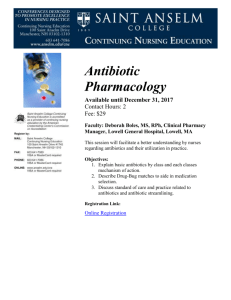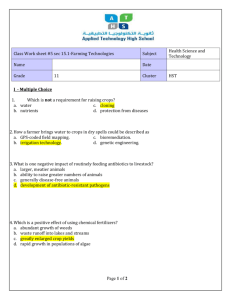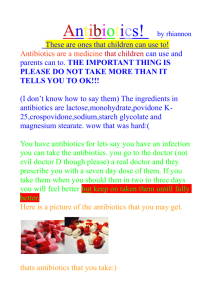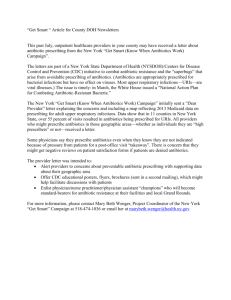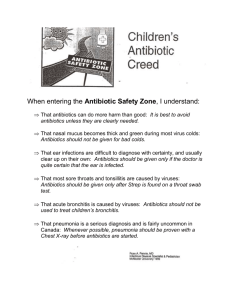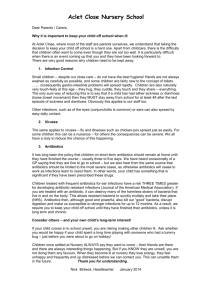Becoming more aware of antibiotics
advertisement
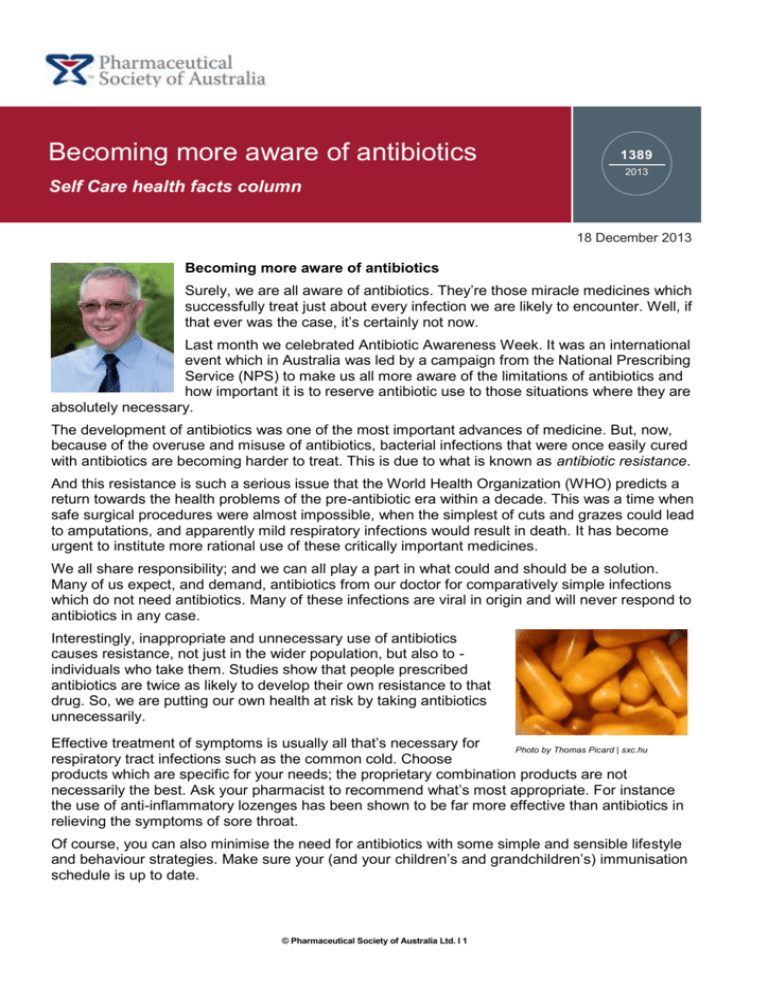
Becoming more aware of antibiotics 1389 2013 Self Care health facts column 18 December 2013 Becoming more aware of antibiotics Surely, we are all aware of antibiotics. They’re those miracle medicines which successfully treat just about every infection we are likely to encounter. Well, if that ever was the case, it’s certainly not now. Last month we celebrated Antibiotic Awareness Week. It was an international event which in Australia was led by a campaign from the National Prescribing Service (NPS) to make us all more aware of the limitations of antibiotics and how important it is to reserve antibiotic use to those situations where they are absolutely necessary. The development of antibiotics was one of the most important advances of medicine. But, now, because of the overuse and misuse of antibiotics, bacterial infections that were once easily cured with antibiotics are becoming harder to treat. This is due to what is known as antibiotic resistance. And this resistance is such a serious issue that the World Health Organization (WHO) predicts a return towards the health problems of the pre-antibiotic era within a decade. This was a time when safe surgical procedures were almost impossible, when the simplest of cuts and grazes could lead to amputations, and apparently mild respiratory infections would result in death. It has become urgent to institute more rational use of these critically important medicines. We all share responsibility; and we can all play a part in what could and should be a solution. Many of us expect, and demand, antibiotics from our doctor for comparatively simple infections which do not need antibiotics. Many of these infections are viral in origin and will never respond to antibiotics in any case. Interestingly, inappropriate and unnecessary use of antibiotics causes resistance, not just in the wider population, but also to individuals who take them. Studies show that people prescribed antibiotics are twice as likely to develop their own resistance to that drug. So, we are putting our own health at risk by taking antibiotics unnecessarily. Effective treatment of symptoms is usually all that’s necessary for Photo by Thomas Picard | sxc.hu respiratory tract infections such as the common cold. Choose products which are specific for your needs; the proprietary combination products are not necessarily the best. Ask your pharmacist to recommend what’s most appropriate. For instance the use of anti-inflammatory lozenges has been shown to be far more effective than antibiotics in relieving the symptoms of sore throat. Of course, you can also minimise the need for antibiotics with some simple and sensible lifestyle and behaviour strategies. Make sure your (and your children’s and grandchildren’s) immunisation schedule is up to date. © Pharmaceutical Society of Australia Ltd. I 1 And help prevent the transmission of infection by regular hand washing (especially before preparing food) and the use of alcohol gels cleansers. If you really have to cough or sneeze, do so into a disposable tissue or the bend in the elbow – not into your hand. Meanwhile, an article in this week’s issue of New Scientist magazine approaches the looming antibiotic crisis from a different point of view. It urges a return to the principles of Florence Nightingale and to “throw open the windows”. Author Frank Swain says that fresh air and sunshine don’t have just psychological benefits. What became known as Nightingale wards in hospitals allowed fresh air to flow freely and to not only dilute airborne infectious organisms but also to actively kill them. It seems WHO agrees. It has published a report urging all healthcare settings to use natural ventilation as far as possible. More advice about preventing, or at least reducing the risk of, infection can be obtained from pharmacies around Australia which provide the Pharmaceutical Society’s Self Care information. There are special “fact cards” on Antibiotics, Childhood Immunisation, Travel Health and a number of specific infectious diseases. For the nearest Self Care location phone 1300 369 772 or log on to the website www.psa.org.au, click on “Self Care” then “Find a Self Care Pharmacy”. © Pharmaceutical Society of Australia Ltd. I 2

